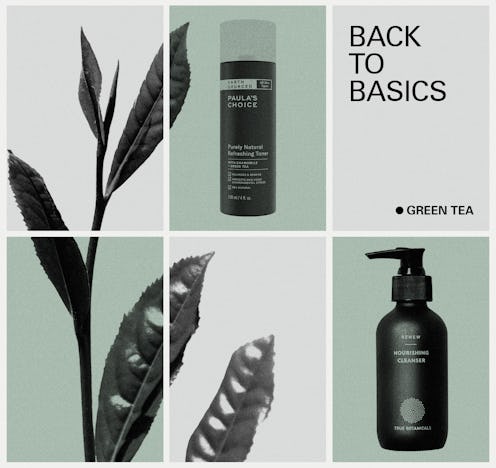(Skin Care)
The Endless List Of Reasons To Start Using Green Tea For Your Skin
Acne, inflammation, hyperpigmentation — it treats it all.

With new products, brands, and categories popping up every day, beauty can be a bit overwhelming. Back to Basics is our rudimentary beauty series that serves as your crash course on the science behind some of the best formulations in the game.
Take a look inside your kitchen cabinet at your tea collection and it’s almost guaranteed that green tea is somewhere in there. Arguably one of the most popular variations of the beverage, the benefits for your overall health are widely known. But more recently, discussions surrounding green tea for your skin have become more prevalent in the beauty community and beyond, proving that the ingredient is just as beneficial externally as it is internally — maybe even more so.
“Green tea is best known for its antioxidant, anti-microbial, and anti-inflammatory properties,” Dr. Ife Rodney, board-certified dermatologist tells TZR. “It contains a high concentration of polyphenols, specifically EGCG, its main active ingredient. It’s no wonder we’re seeing more of it now.” She says that as more and more people grow interested in clean skin care and natural ingredients, they’re paying more attention to their products’ labels and what is proven safe and effective. Green tea hits all the marks. To start, it’s ideal for oily skin as it is anti-androgenic, which Dr. Rodney says refers to androgens (the hormones that help produce sebum). Green tea can slow down oil production, thereby preventing breakouts.
“In addition, it can help fight skin cancer through DNA repair and has anti-inflammatory properties that help reduce redness, painful pimples, and acne scarring,” she says. But that’s not all. It’s also anti-bacterial, meaning it kills acne-causing bacteria that live in your pores, and the caffeine in green tea helps with puffy eyes and dark circles via its polyphenols and antioxidant properties. Plus, products that contain green tea are known to reduce hyperpigmentation and skin discoloration, according to Dr. Rodney. Basically, there’s very little that green tea can’t do to improve the look and feel of your skin.
Furthermore, due to its gentle nature, the ingredient meshes well with others. “Since green tea is considered an antioxidant, it works wonderfully with other antioxidants like vitamin C and vitamin E,” Dr. Rodney says. “It also works well with bakuchiol and hydrating ingredients like hyaluronic acid.” It’s also safe for most skin types, making it a welcome addition to most everyone’s skin care lineup. “You can use high-quality products that contain green tea as part of your daily skin care routine,” Dr. Rodney says, stating that the ingredient is effective in a range of product types, including cleansers, moisturizers, serums, face masks, and even sunscreen.
However, Dr. Ranella Hirsch, MD, board-certified dermatologist and co-founder of Atolla, still insists on being careful when trying out a product with green tea. “It’s well-suited for people who are looking for a good antioxidant choice but perhaps can’t tolerate vitamin C, or someone with a more reactive skin sub-type,” he says. And Dr. Rodney concurs. “As with all topical products, if used in too high a concentration, green tea can cause skin irritation and inflammation,” Dr. Rodney says. “This may present as itching or burning, and can even result in skin discoloration.”
And what about your daily cup of green tea? Will you see those skin benefits by consuming it on a regular basis? The answer is still unclear. “Taking green tea orally may not have as much benefit as using it topically,” Dr. Rodney says. “When ingested, you’re not guaranteed that the antioxidant and anti-inflammatory properties are going straight to your skin. It’s best to use a topical cream or serum, along with those extra cups of tea.”
However, Dr. Hirsch says that in some instances, internal use may be better. “I’m not aware of any studies looking head-on at using oral versus topical options,” she says. “Topical EGCG (a plant-based compound found in green tea) doesn’t permit green tea to penetrate deeply into the skin so certain benefits would have to come from ingestion.” But if you are taking green tea internally — either through tea or supplements — be cautious “By mouth there are certain interactions that people need to be mindful of,” Dr. Hirsch says. “That includes certain antibiotics and birth control and other medications.”
So whether you’re struggling with acne, or just need a simple radiance boost, check out these green tea-packed products to shop ahead.
We only include products that have been independently selected by TZR's editorial team. However, we may receive a portion of sales if you purchase a product through a link in this article.